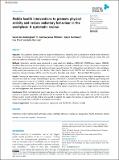Mobile health interventions to promote physical activity and reduce sedentary behaviour in the workplace : a systematic review
Abstract
Objective This systematic review aimed to assess the effectiveness, feasibility and acceptability of mobile health (mHealth) technology (including wearable activity monitors and smartphone applications) for promoting physical activity (PA) and reducing sedentary behaviour (SB) in workplace settings. Methods Systematic searches were conducted in seven electronic databases (MEDLINE, SPORTDiscus, Scopus, EMBASE, PsycINFO, Web of Science and the Cochrane library). Studies were included if mHealth was a major intervention component, PA/SB was a primary outcome, and participants were recruited and/or the intervention was delivered in the workplace. Study quality was assessed using the Effective Public Health Practice Project (EPHPP) tool. Interventions were coded for behaviour change techniques (BCTs) using the Coventry, Aberdeen and London – Refined (CALO-RE) taxonomy. Results Twenty-five experimental and quasi-experimental studies were included. Studies were highly heterogeneous and only one was rated as ‘strong’ methodological quality. Common BCTs included self-monitoring, feedback, goal-setting and social comparison. A total of 14/25 (56%) studies reported a significant increase in PA, and 4/10 (40%) reported a significant reduction in sedentary time; 11/16 (69%) studies reported a significant impact on secondary outcomes including reductions in weight, systolic blood pressure and total cholesterol. While overall acceptability was high, a large decline in technology use and engagement was observed over time. Conclusions While methodological quality was generally weak, there is reasonable evidence for mHealth in a workplace context as a feasible, acceptable and effective tool to promote PA. The impact in the longer term and on SB is less clear. Higher quality, mixed methods studies are needed to explore the reasons for decline in engagement with time and the longer-term potential of mHealth in workplace interventions. Protocol registration : The review protocol was registered with PROSPERO: CRD42017058856
Citation
Buckingham , S , Williams , A J , Morrissey , K , Price , L & Harrison , J 2019 , ' Mobile health interventions to promote physical activity and reduce sedentary behaviour in the workplace : a systematic review ' , Digital Health , vol. 5 , pp. 1-50 . https://doi.org/10.1177/2055207619839883
Publication
Digital Health
Status
Peer reviewed
ISSN
2055-2076Type
Journal item
Collections
Items in the St Andrews Research Repository are protected by copyright, with all rights reserved, unless otherwise indicated.
Related items
Showing items related by title, author, creator and subject.
-
Effect of free medicine distribution on health care costs in Canada over 3 years : a secondary analysis of the CLEAN meds randomized clinical trial
Persaud, Nav; Bedard, Michael; Boozary, Andrew; Glazier, Richard H; Gomes, Tara; Hwang, Stephen W; Jüni, Peter; Law, Michael R; Mamdani, Muhammad; Manns, Braden; Martin, Danielle; Morgan, Steven G; Oh, Paul; Pinto, Andrew D; Shah, Baiju R; Sullivan, Frank; Umali, Norman; Thorpe, Kevin E; Tu, Karen; Wu, Fangyun; Laupacis, Andreas; CLEAN Meds study team (2023-05-26) - Journal articleIMPORTANCE : Few interventions are proven to reduce total health care costs, and addressing cost-related nonadherence has the potential to do so. OBJECTIVE : To determine the effect of eliminating out-of-pocket medication ... -
Pädiatrische versorgungskonzepte in Europa
Weber, Martin W; Backhaus, Sophia; Chukwujama, Obiora; Fenski, Friederike; Henking, Christoph; Schatte, Laura; Aleman-Diaz, Aixa Y (2018-01-19) - Journal articleTo promote children’s health in Europe, the World Health Organization (WHO) developed the European child and adolescent health strategy 2015–2020, which is supported and will be implemented by all Member States (MS). In ... -
Arts-based approaches to promoting health in sub-Saharan Africa : a scoping review
Bunn, Christopher; Kalinga, Chisomo; Mtema, Otiyela; Abdulla, Sharifa; DIllip, Angel; Lwanda, John; Mtenga, Sally M.; Sharp, Jo; Strachan, Zoë; Gray, Cindy M. (2020-05-21) - Journal itemIntroduction Arts-based approaches to health promotion have been used widely across sub-Saharan Africa (SSA), particularly in public health responses to HIV/AIDS. Such approaches draw on deep-rooted historical traditions ...

